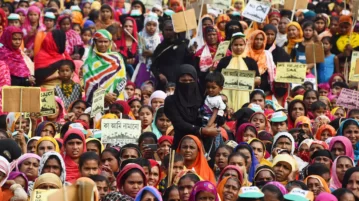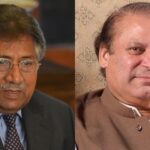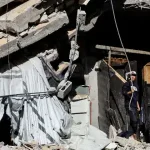The BJP-led government in IIOJK used a gerrymandering tactic to delimit constituencies, giving more assembly seats to the minority Hindu population over the Muslim majority population, which not only hurt the sentiments of Kashmiris on both sides of the border but also united the political leadership of IIOJK to oppose this illegal Indian move.
Gerrymandering is a method of political control of election district borders in advanced democracies with the goal of delivering undue benefit to a party, faction, or socioeconomic class within the constituency. Gerrymandering employs two main strategies: “cracking” and “packing.”
Though delimitation in IIOJK has been on the BJP’s agenda since 1995, when the state’s previous delimitation process took place, in its “Draft proposal” released in December 2021, the delimitation panel constituted by the Modi administration suggested six new assembly seats for the Jammu district and only one additional seat for Kashmir.
Five of Srinagar’s eight assembly segments would be redrawn, according to the Commission. The Habba Kadal assembly sector, which had a large percentage of Kashmiri Pandit voters, has been divided into three seats under the revised proposals. It has been planned to consolidate and construct new constituencies on a large scale in North Kashmir and Budgam in Central Kashmir.
Sangrama would most likely be amalgamated into several electorates in North Kashmir, while the Kunzer area would most likely become a new assembly segment. Rajouri and Poonch, which have a large Hindu population, will form part of the Anantnag parliamentary body electorate in South Kashmir, which previously had a predominantly Muslim plurality. The idea will increase the number of assembly seats in Jammu from 37 to 43, and from 46 to 47 in Kashmir.
According to numbers from the 1995 delimitation, Kashmir had just 55.42 percent representation in the assembly while having 56.15 percent of the population, whereas Jammu had 44.57 percent representation in the assembly despite having 43.84 percent of the population.
The recent visit of Indian Prime Minister Modi to IIOJK on April 24, 2022, appears to be an attempt on his part to rally support for the finalization and implementation of the IIOJK delimitation commission report, as well as to launch a persuasive campaign to develop a favorable public opinion for the commission’s recommendations. Third, his visit was intended to assuage growing international worries over Indian occupying troops’ HRAs in IIOJK.
Though Prime Minister Modi has stated that statehood in the valley will be restored once the situation returns to normal, his true plan to impose Hindu Raj on IIOJK through political coercion and appointing a Hindu CM in Muslim majority areas in IIOJK after delimitations have been exposed, and not only the people of IIOJK but also its political leadership and international stakeholders, would flatly reject any such attempt by the Indian government.
After recommending an increase of six seats in Jammu and one in Kashmir, the commission’s findings drew harsh criticism, particularly from Kashmir-based political groups. All political forces in IIOJK, including the “Apni Party”, which was previously dubbed the BJP’s B group by the Peoples’ Alliance for Gupkar Declaration (PAGD), have rejected the commission’s proposals, calling them an “attack on the political incomparability of Kashmir in J&K’s legislative issues” and “part of the series of measures launched by the BJP-led government on the fifth of August 2019 to undermine Kashmiris of IIOJK.” The National Conference (NC) slammed the panel findings, calling the recommendations “illegal.” The subsequent draft can be described as an overt act of “gerrymandering” in which constituencies are redrawn to give Hindus a larger share of the vote.
Omar Abdullah said, “The proposal of the J&K delimitation commission is unacceptable. The distribution of recently created assembly constituencies with 6 going to Jammu and simply 1 to Kashmir isn’t legitimized by data of the 2011 census”. Mehbooba Mufti said “the real game plan is to introduce an administration in J&K which will legitimize the unlawful and illegal acts of 5 August 2019. They want to pitch individuals against one another by disregarding the population census and proposing 6 seats for one region and just one for Kashmir”.
The idea “smells of a predisposition,” according to Sajad Ghani Lone, and is a “shock to the citizens who have trust in a majority-rule democratic administration in Kashmir.” The Gupkar alliance has also denied the delimitation commission’s suggestion, stating that, in light of UN resolutions, India has no lawful authority to classify Jammu and Kashmir as a disputed area; India illegally undertook the activity under the guise of the repeal of Article 370 and 35A. India has done the delimitation on purpose in order to hold and win elections and persuade the rest of the world of its commitment to democratic ideals.
The subject of IIOJK has always been a flashpoint between India and Pakistan, as evidenced by the fact that three wars have been fought between the two nuclear neighboring states over this long-standing unresolved problem.
The BJP-led Indian government is waging a military campaign against the valley’s unarmed and heroic people, who are fighting for their right to self-determination in light of UN statements. Despite the fact that many international human rights organizations, UN bodies, and the international community are raising their voices against human rights violations by Indian forces in IIOJK, the Indian rulers remain adamant and continue to suppress the voices of Kashmiris, in clear violation of UN declarations and international laws.
Kashmir is a critical issue that affects regional and worldwide peace and security. Despite the prolonged imposition of curfew-cum lockdown in IIOJK since August 5, 2019, Indian Prime Minister Narendra Modi’s brutalities have continued, and he has now gone beyond the heights of brutality by bringing delimitations in IIOJK to lower assembly seats of the Muslim majority and raise assembly seats of the Hindu minority.
This audacity on the part of the Indian government is a direct attack on the people of IIOJK’s democratic rights, notably those of Muslims, and it reveals India’s true face to regional and worldwide power corridors. Pakistan would also continue to assist Kashmiri brothers and sisters in their just fight in all regional and international forums, morally, politically, and diplomatically. Second, the valley’s tenacious and brave people, particularly the youth, will not tolerate any such action by the self-proclaimed defender of democracy and the so-called secular state, which is built entirely on the foundation of deception. The people of IIOJK perceive a dark future under the Indian administration, and they now want to be free of the captivity imposed unjustly by Indian expansionist intentions.








